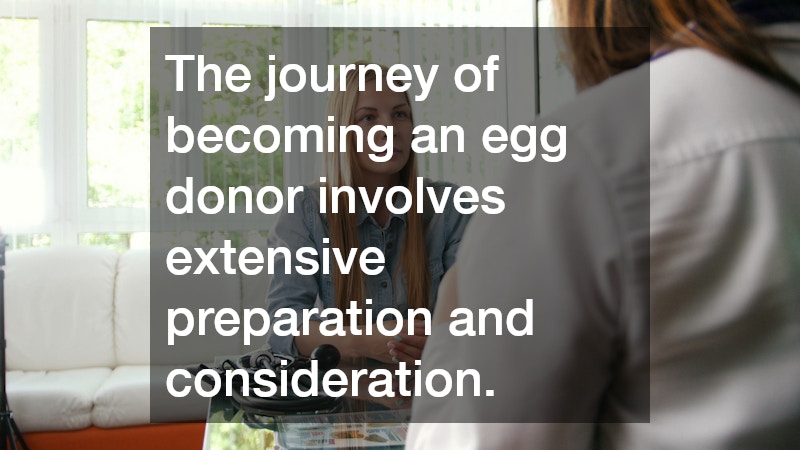Egg donation is a process where a woman provides one or several eggs for assisted reproduction or biomedical research. It plays a crucial role in helping individuals and couples who wish to conceive but face fertility challenges. The process involves a comprehensive screening and a series of medical procedures to retrieve the donor’s eggs. Egg donors are usually women aged between 21 to 35 years, meeting specific health and medical criteria. This supportive act of giving one’s egg can have a profound impact on the lives of others, offering them a chance to start a family.
The journey of becoming an egg donor involves extensive preparation and consideration. Potential donors must undergo rigorous health assessments, including physical examinations and genetic testing. This ensures that both the donor and any future child born from the donation are healthy. Eligibility also often requires psychological evaluations to prepare donors for the emotional aspects of the process. The process underscores the significant commitment an egg donor makes, as well as the pivotal role they play in family building.
Egg donation can be an intimate and rewarding experience, although it may also entail certain risks and ethical considerations. There are hormones involved in stimulating the ovaries to produce multiple eggs, which can sometimes cause physical discomfort. Furthermore, the process raises ethical debates around fertility and reproductive rights. Adequate counseling and support are vital to navigate these challenges effectively. Because of this complexity, understanding all facets of egg donation is essential for anyone considering becoming an egg donor.
The Egg Donation Process
The egg donation process begins with a donor application, involving various interviews and screenings. The initial phase involves meeting eligibility criteria, followed by detailed medical and psychological assessments. Once approved, donors enter a synchronized cycle with the recipient to facilitate the egg retrieval process. Ovarian stimulation drugs are administered over 10 to 14 days to induce the production of multiple eggs. The intricacy of this phase highlights the importance of seeking skilled medical guidance and emotional support.
After ovarian stimulation, the donor’s progress is closely monitored through blood tests and ultrasounds. This step ensures that the eggs are developing healthily and ready for retrieval at the optimal time. The egg retrieval is a minor outpatient procedure performed under sedation, usually taking about 20 to 30 minutes. Donors typically recover rapidly, but aftercare instructions and follow-up appointments are crucial for ensuring well-being. This meticulous and carefully coordinated procedure exemplifies the diligence required throughout the egg donation journey.
Following egg retrieval, donated eggs are either fertilized for immediate use or cryopreserved for future use by the recipient. Fertilization may involve in vitro techniques where the donor eggs are combined with sperm in a lab setting. If successfully fertilized, these embryos can be transferred to the recipient’s uterus or stored for future use. The confidentiality and anonymity of the donor are often maintained, though this varies depending on legal frameworks and donor agreements. This end-stage signifies the completion of the donor’s immediate role, yet underscores the long-term effects and responsibilities tied to the donation.
Benefits and Considerations for Egg Donors
Being an egg donor can be a deeply rewarding experience, offering life-changing opportunities to infertile couples. Many donors find satisfaction in knowing they’ve helped individuals achieve their dreams of becoming parents. Furthermore, the experience offers personal growth through self-awareness and a deeper understanding of reproductive health. Some programs provide compensation for donors as a recognition of their time, effort, and commitment. Feeling part of a supportive donor community can also enrich this transformative journey.
Despite the rewards, potential donors must consider various factors before proceeding. These include understanding the physical and emotional implications of undergoing hormone therapy and egg retrieval. Some donors may experience side effects such as mood swings, bloating, or temporary discomfort from the procedure. Additionally, comprehending the legal aspects, such as anonymity and parental rights, is crucial before committing to donation. Being well-informed helps donors make empowered decisions while keeping their long-term health and well-being in focus.
The decision to become an egg donor is significant, often intertwining personal beliefs with the desire to help others. Ethical reflection on the consequences of donation and the future implications for the donor’s genetics is important. This includes understanding the potential for contact with donor-conceived offspring if laws or personal preferences permit. Balancing altruism with awareness of personal boundaries helps create a rewarding egg donation experience. Comprehensive guidance and support throughout the process aid in achieving this balance, ensuring clarity and confidence for donors.
Legal and Ethical Considerations
Egg donation is regulated by diverse laws and ethical guidelines to ensure the safety and well-being of all parties involved. These regulations vary significantly across different countries and states, affecting the anonymity and rights of donors and recipients. Understanding these legal requirements is essential to navigate the complexities of egg donation successfully. Donors should consult with legal and medical professionals to fully comprehend the implications of their donation. This knowledge empowers donors to make informed choices aligned with their values and commitments.
Ethical considerations in egg donation touch upon parenthood, genetics, and the rights of the child born from the donation. There is ongoing debate regarding the anonymity of donors versus the rights of donor-conceived individuals to know their origins. Some jurisdictions mandate that donor identities be disclosed once offspring reach a particular age. Balancing these ethical dilemmas with compassion and respect for individual rights is critical. Legal frameworks strive to protect everyone involved, yet personal values significantly influence how these issues are addressed.
Transparency and clear communication are vital throughout the egg donation process to prevent misunderstandings. Contracts between donors and clinics or recipients outline the expectations, responsibilities, and rights of each party. Prior agreements regarding anonymity or future contact with donor-conceived children must be explicitly stated. Recognizing the ethical dimensions of egg donation fosters respectful dialogue and informed decision-making. Acknowledging these considerations enriches the understanding and outcomes of the egg donation experience, benefitting both donors and recipients.






